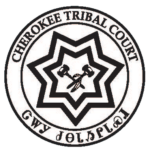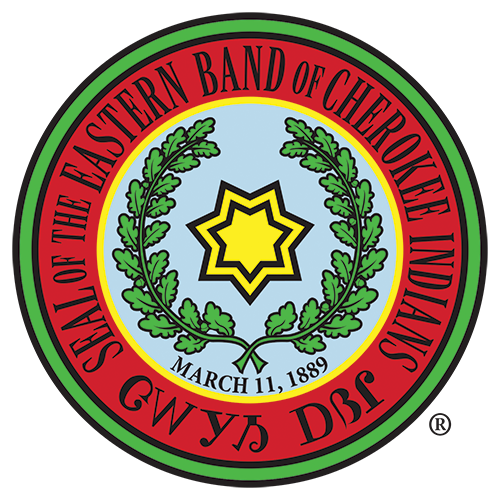
Judicial Branch/EBCI Tribal Court
Leaders Among Indian Country Court Systems
Judicial
Codified by Cherokee Code Section 7, the Cherokee Courts make up the Judicial Branch of government, one of the three branches of government of the EBCI. The Court’s independence is specifically protected under the Code, which requires a 2/3 majority vote of Tribal Council to amend any judicial ordinance.
Consisting of a trial court and an appellate court (Supreme Court), the Courts resolve approximately 1,400 criminal and civil matters each year that arise on trust property. Headed by a Chief Justice, a Chief Judge, two full-time Associate Judges, two Associate Appellate Justices, and numerous Temporary Judges/Justices, all of whom have been nominated by the Principal Chief and confirmed by the Tribal Council, the Court is among the leaders in tribal courts nationwide.

Over what and whom do the Cherokee Courts preside?
The Cherokee Courts hear criminal, civil, domestic violence (civil and criminal), small claims, juvenile, traffic, Family Safety, child support and wellness court cases, with sessions nearly every day.
In short, through great effort, we at the Cherokee Courts have succeeded in making our system fully functional and have established ourselves as leaders among Indian Country court systems.
Notable aspects and accomplishments of the Cherokee Court
 The Court is the only tribal court in the country to host Federal Central Violations Bureau (CVB) Court quarterly and houses a satellite federal probation office. The North Carolina State Bar Association must license all attorneys and judges practicing within the Cherokee Courts, and each defendant is afforded the right to a court-appointed attorney and all rights available in any other court in the country. Jury trials, with a jury pool containing non-Indians, are available for every criminal or civil matter.
The Court is the only tribal court in the country to host Federal Central Violations Bureau (CVB) Court quarterly and houses a satellite federal probation office. The North Carolina State Bar Association must license all attorneys and judges practicing within the Cherokee Courts, and each defendant is afforded the right to a court-appointed attorney and all rights available in any other court in the country. Jury trials, with a jury pool containing non-Indians, are available for every criminal or civil matter.
The Cherokee Courts are one of only a handful of tribal courts to institute both the Tribal Law and Order Act (TLOA) enhanced sentencing and the Violence Against Women Act of 2013 (VAWA) allowing prosecution of non-Indians for certain domestic violence (DV) crimes. TLOA allows the Court to hand down sentences of up to three years for individual charges and up to nine years in combination, while VAWA gives the Court jurisdiction to hear DV crimes between intimate partners when the victim is a Tribal member residing on trust property and the defendant is non-Indian.
Tribal Court Documents
- 50C Packet
- 50C Show Cause
- Adult Name Change Packet
- Affidavit as to Status of Minor Child
- Affidavit of Service of Process by
- Application for Court Appointed Attorney
- Background Check Request
- Bond Reimbursement Forms
- Bondsman Application
- Chapter 25
- Cherokee Bar Application for Admission to Practice
- Cherokee Supreme Court Appeal Procedures
- Child Custody Packet-Do it yourself
- Child Support Show Cause
- Civil Motion to Continue
- Civil Notice of Hearing
- Civil Summons
- CS Foreign Judgment Order
- Dismissal Notice of Reinstatement
- Divorce Packet-Do it yourself
- DV Voluntary Dismissal
- Estate Packet with a Will
- Estate Packet without a Will
- Estate Procedures
- Eviction Claim Process
- Guardianship Packet
- Limited Driving Privilege
- Minor Name Change Packet
- Minor POA
- Motion for leave to service by publication
- Motion for Order to Appear and Show Cause
- Motion to Modification Custody
- Motion to Modify Child Support Order
- Motion to Return Property (non-firearm)
- Notice of Satisfaction
- Notice of Voluntary Dismissal
- Order for Dismissal, Discontinuance, or Continuance
- Pauper-Petition to Waive Cost and Fees
- POA Revocation
- Renunciation of rights to qualify
- Repossession Packet
- Request for Release from Subpoena
- Return of Seized Items
- Servicemembers Affidavit
- Small Claims Packet
- Small Claims Summons
- Subpoena
- Verification
- Waiver of Counsel
- Waiver of Service
Tribal Court Contact List
Cherokee Tribal Courthouse:
(828) 359-1068
Mailing Address:
PO Box 1629, Cherokee NC 28719
Physical Address:
137 Seven Clans Lane, Cherokee NC 28719
Tribal Court Magistrates:
(828) 359-6697 – Daytime Hours (7:45am-4:30pm)
(828) 497-4131 – Nighttime Hours (4:30pm-7:45am)
For Power of Attorney questions,
please contact Legal Services at (828) 359-7400
